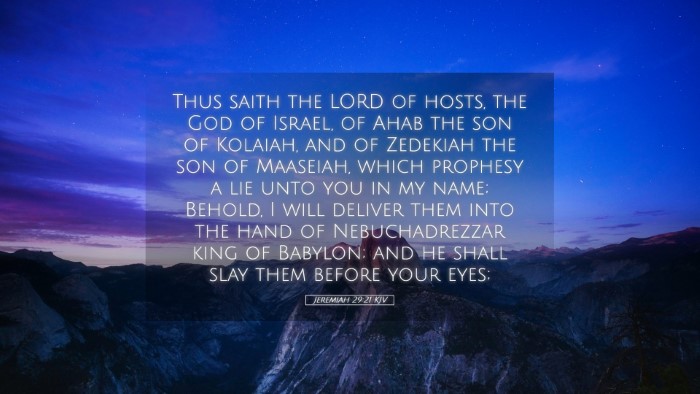Commentary on Jeremiah 29:21
Verse Context: Jeremiah 29:21 states, "Thus saith the Lord of hosts, the God of Israel, concerning Ahab the son of Kolaiah, and concerning Zedekiah the son of Maaseiah, which prophesy a lie unto you in my name; behold, I will deliver them into the hand of Nebuchadnezzar king of Babylon; and he shall slay them before your eyes." This verse is part of a letter written by Jeremiah to the exiles in Babylon, reminding them of the true nature of their situation and the falsehood prophesied by some among them.
Analysis of Key Themes
-
Divine Judgement: The verse clearly indicates that the Lord will bring judgment upon false prophets like Ahab and Zedekiah. This serves as a reminder that God is not indifferent to the integrity of His word and the teachings of those who declare His name.
Matthew Henry notes that "God is a God of truth and will surely punish those that deceive His people in His name." This points to the seriousness of accountability in spiritual leadership.
-
False Prophets: The mention of Ahab and Zedekiah represents a broader theme of the dangers posed by false prophets within the community. These individuals were misleading the exiles, encouraging them with false hopes.
Albert Barnes remarks that "the false prophets aimed to comfort the people with false promises, contrary to God's actual decree." This highlights the importance of discernment among believers regarding whom to trust in their spiritual journey.
-
National Consequences: The verse places Ahab and Zedekiah's personal fate within the larger narrative of Israel's identity as a nation. Their disobedience and false prophecies contribute directly to the suffering experienced by the people.
Adam Clarke asserts that "the fate of these pretenders serves as a caution to others; for the sins of leaders often lead to the downfall of the many." This indicates a communal responsibility in both leadership and following.
Theological Implications
This passage confronts us with profound theological implications regarding divine sovereignty and human accountability. God’s sovereignty is evident in His foreknowledge of the actions of Ahab and Zedekiah, and His power to execute judgment upon them. Conversely, the accountability of these prophets emphasizes the moral responsibility that comes with leadership in faith communities.
-
God's Sovereignty: A pivotal takeaway is that every proclamation made in God’s name must align with His truth, lest one face divine retribution. Matthew Henry emphasizes that "God’s cloaked judgments come as a result of sin and falsehood, reminding us that His plans cannot be thwarted."
-
Integrity of Prophecy: The integrity of God’s message is paramount. False prophecies not only mislead individuals but threaten the community's covenant relationship with God. Albert Barnes encourages rigorous scrutiny of every prophetic voice, advising that genuine prophecy will always align with the character and will of God.
Practical Application for Today
For pastors, students, theologians, and scholars, this passage rings with practical importance as it underscores the necessity of discernment in our spiritual communities. Here are some reflections to consider:
-
Discernment in Leadership: Leadership carries a grave responsibility. Adam Clarke suggests that leaders must strive for integrity and a deep understanding of Scripture to avoid leading their congregations astray.
-
Accountability: This passage invites us to foster an environment of accountability. Ultimately, each believer plays a role in upholding truth within the body of Christ.
-
Hope and Truth: Amidst falsehood, the message of genuine hope lies within the truth of God’s Word. As exiles, the faithful must learn to discern God’s voice amidst the cacophony of falsehoods that may seek to comfort them.
Conclusion
Jeremiah 29:21 serves as a timeless reminder of the importance of truth, the dangers posed by false prophecy, and the sovereignty of God over human affairs. As we reflect on this scripture, let us commit ourselves to truthfulness in our teachings and remain steadfast in our pursuit of understanding God’s will in all circumstances.


